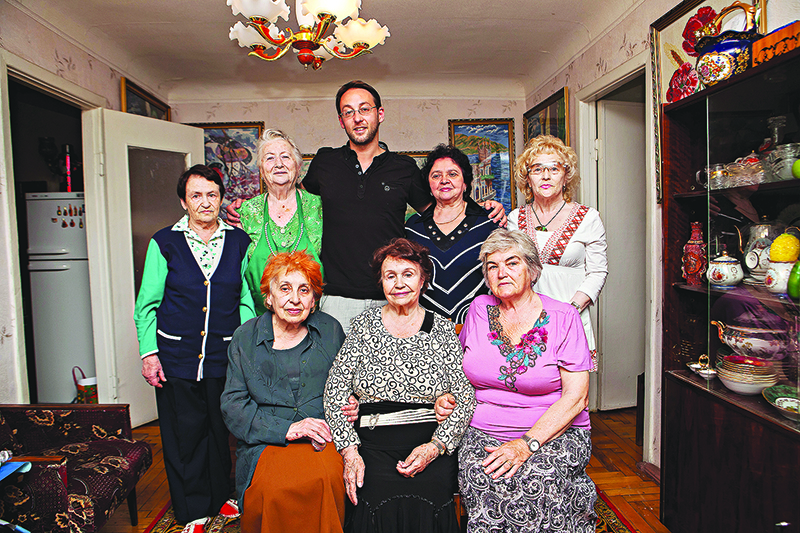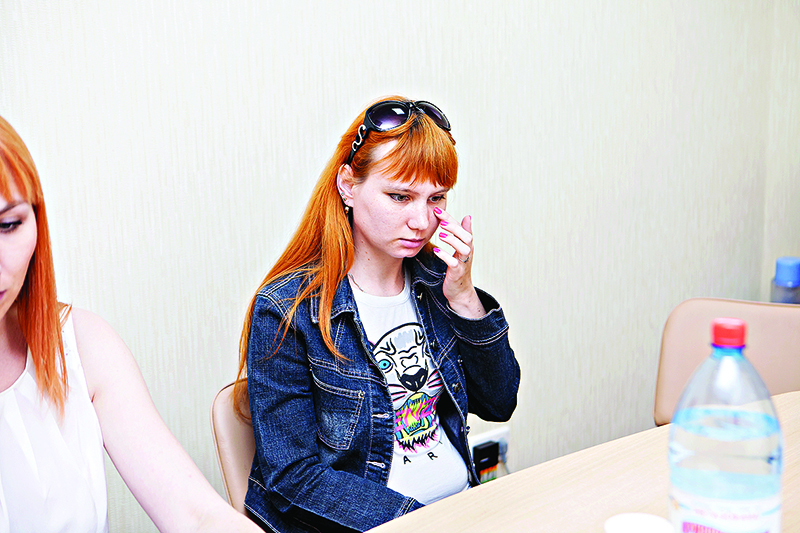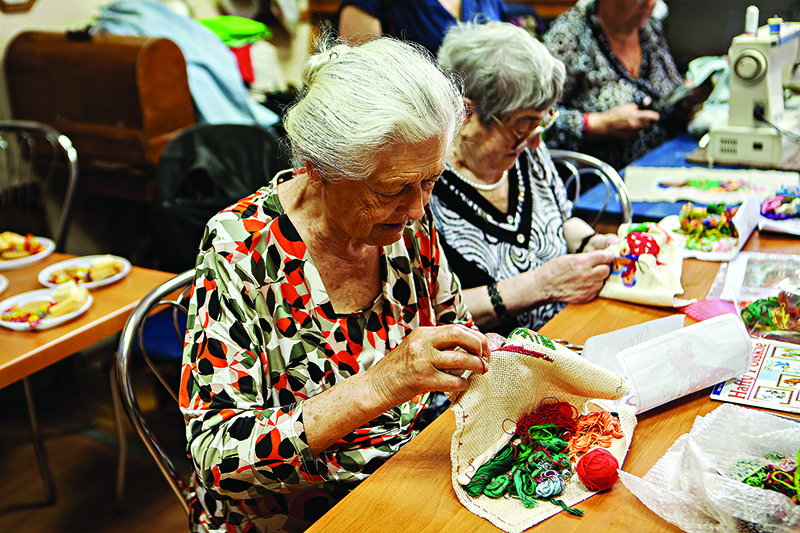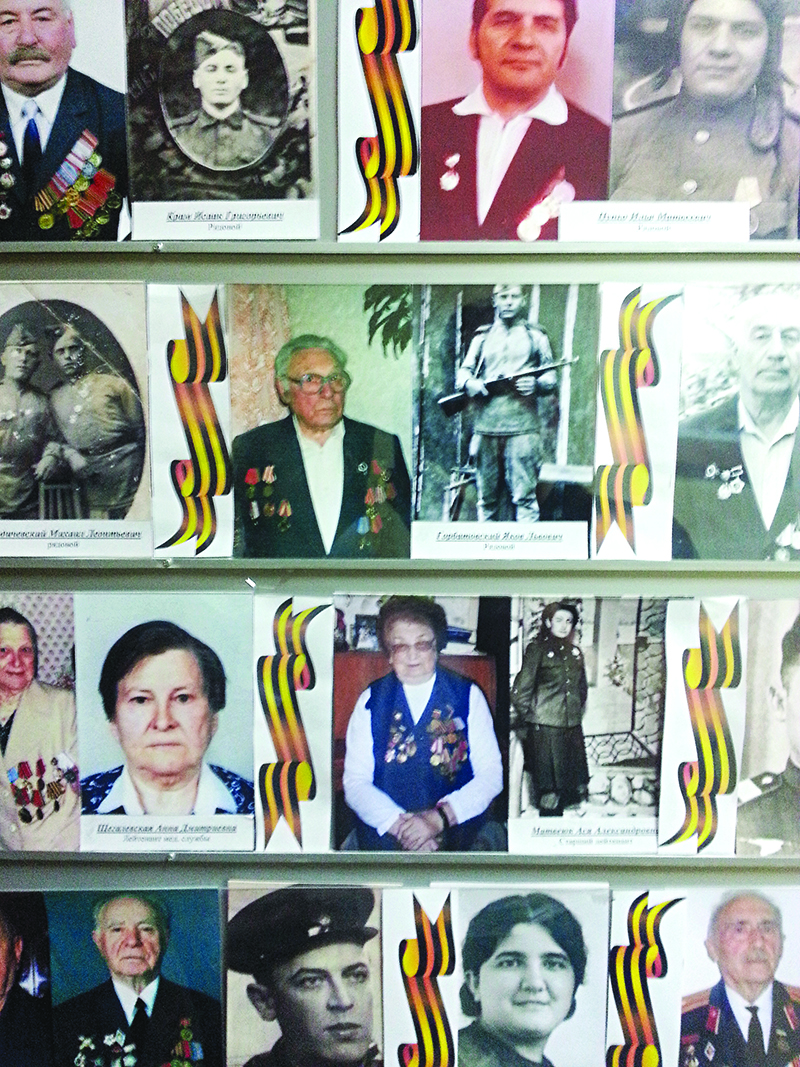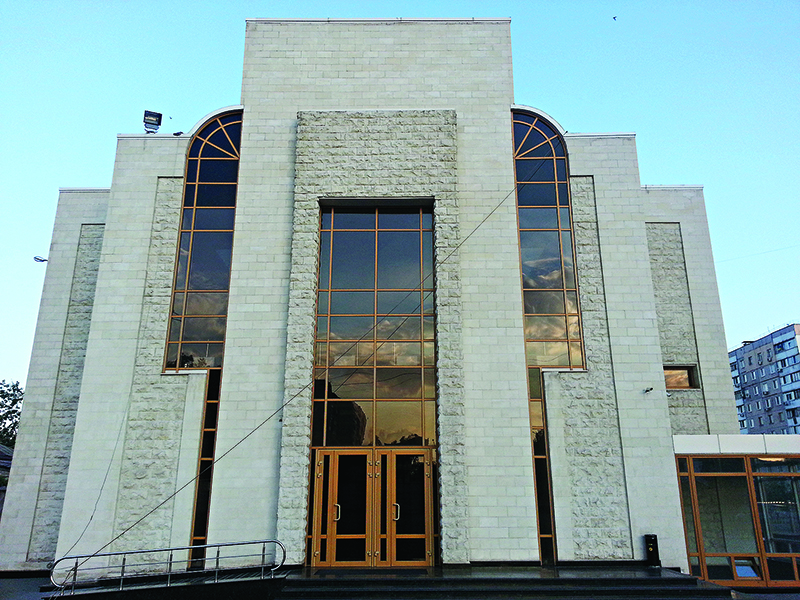SPECIAL REPORT: The Jews of Ukraine who left their lives behind
Thousands of members of the Jewish community have fled the fighting. Stephen Oryszczuk meets those who left their life behind.
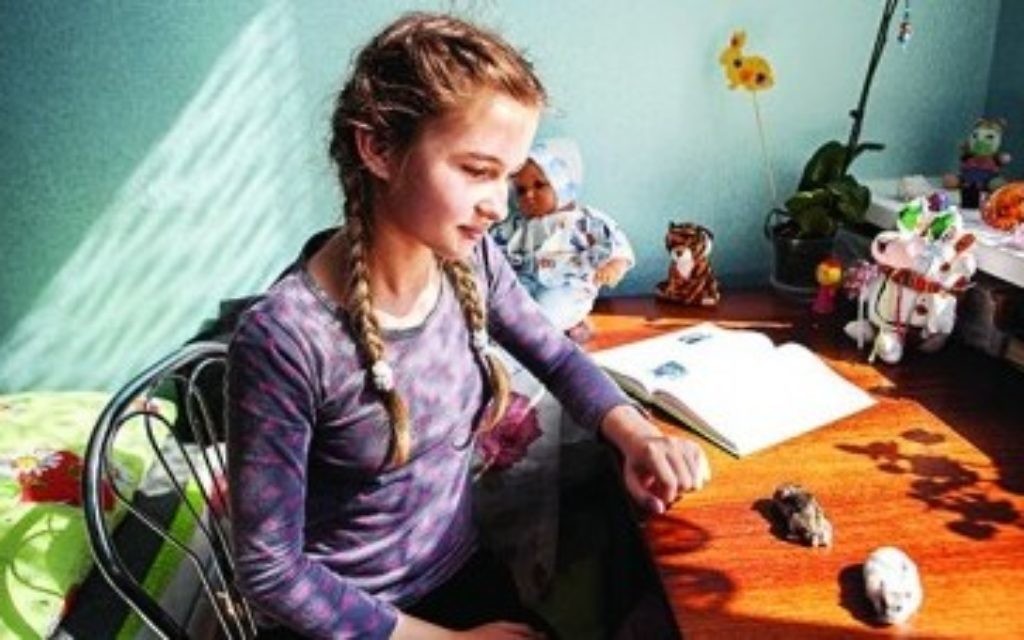
Imagine you’re at the train station, about to go home after a week’s break, when you learn you can’t get back, because the railway line’s been blown up and your home is now a war zone.
For 49-year-old mother Valentina, it’s anything but imaginary.
Her life now is one of plastic bags and temporary shelters. An experienced pharmacist with an 11-year-old daughter, she sits on a bed in a tiny room, telling a story that’s still painful. Stranded, communications down, first she heard that her hospital had been bombed, then that her home had been flooded byburst pipes.
Get The Jewish News Daily Edition by email and never miss our top stories Free Sign Up
Now, here in Zaporizhya, central Ukraine, she can’t get a job, and can’t afford medicine for her bed-ridden mother.
Question. Answer. Question. Answer.
Few hand movements, just a soft, tired voice.
The only pause comes when she’s asked how she feels. “Helpless,” she says at last, a tiny tear running down her cheek. A quick wipe and it’s gone. It was almost imperceptible, much like her, one refugee among a million. She straightens her back and clears her voice. The psychologist has helped, she says, by showing her that “there are others in a worse situation”.
Were it not so. 42-year-old Lyuda, an accountant living in the dorms of an old Jewish school, is just back from Donetsk, a big city in the rebel-held east. “Best not ask about it,” says the translator, as Lyuda leaves the room. “She went to bury her husband.”
After sitting on so many beds, you realise that this war has a face.
It’s the face of 75-year-old Larisa, another internally displaced person (IDP) who recalls life in a Donetsk basement as war waged around her, or of Alexander, her husband, who ventured out under gunfire so they didn’t starve.
It’s the face of Roman, an esteemed psychiatrist who lost everything. Of Tatyana, who was handed her grandson through the window of a moving bus. Of Nadia, 13, who now knows the force of an explosion.
And it’s the face of Lyuda, returning to the room, describing jets and tanks, all the while looking distant and lost.
You needn’t speak the language to feel this war has taken more than just her husband. All these people are supported by World Jewish Relief (WJR), which knows that war is just the country’s latest problem. It was already desperately poor, and struggling to repay its debt.
Now, soldiers have to buy their own kit. Valentina says she only gets a “special” allowance of £18 per month from the government, because she is a single mother. But with her mother’s medical needs and the proposed bed rental costs for shelters, it is just a tenth of what she needs, and she is only kept afloat by WJR.
The intervention of charities has averted a humanitarian disaster. By some estimates, there are 300,000 Jews in Ukraine (more than in Britain) and many live in or near a state of poverty, so the charity’s funding is not limited to internal refugees, most pressing though that issue is.
The Wohl Livelihood Development Programme, set up in 2012, is one such way to help, offering training and employment-matching for Jewish community members who fall on hard times.
More than 630 people, including some displaced by the fighting, have now been through the 10-day programme. It is as much about confidence as anything else. Some go on to get jobs, others request micro loans, to set up on their own.
Anya, 27, is asking money for hairdressing equipment, for her own mobile service. An independent panel decides, but this is no Dragon’s Den. She supports a five-year-old boy, an unemployed brother and an alcoholic father. With her own business, Anya, her husband and her young son could leave their small, shared flat for a life of their own.
Elsewhere, the Jewish Community Centre helps Jews with disabilities. Its head, Inessa Nosenko, a force of nature, says it recently mapped areas requiring disabled access across the city and pushed authorities until something was done.
In addition, they identified the only four city bus drivers who regularly stopped long enough for wheelchair users to get on, then very publicly thanked them. “We told everyone about these four wonderful men,” she says, a twinkle in her eye. “TV, radio, papers, everyone knew who stopped and who didn’t. Things changed quite quickly after that.”
Disabled or not, people here want to work, but the number of vacancies has fallen by 40 percent, and the number of candidates per job has quadrupled, which has led to locals blaming them. 61-year-old Vladimir considers himself one of the lucky ones.
After a rocket blew up his neighbour’s hallway in Luhansk, he was on a bus within hours and now, after months of interviews, he finally has a job as a security guard. “People are dying of starvation,” he says.
“There’s no food on the shelves, buildings are destroyed, water and gas supplies are disrupted. Everyone wants to go back home, but there are no salaries. People are paid in meat or oil. Prices have increased four or five times.”
He looks down for a second and sighs. “When something terrible happens far away, you think it will never reach you. But in Ukraine it has. Now we just have to deal with it as best we can.”
‘Jewish Cossacks’ hope that history doesn’t repeat itself
Stood atop a hilly Dnieper River island once controlled by Zaporizhian Cossacks, war seems far away. Birds flock to rocky outcrops, tourists ride through trees, lovers pose for photos by models of moustachioed warriors. The atmosphere here is quiet, contemplative and calm, but the reality
is anything but, because this is the next front line in a war that spreads like cancer.
A few miles behind us, fighters from the Right Sector militia are stationed in their rear base, supplementing the Ukrainian army. They are credited with halting the Russian advance in such places as the port city of Mariupol, dying in large numbers doing so. Many Ukrainians see them as heroes, doing what the regular army cannot or will not do. Russians say they are fascists.
“They’re portrayed as a fearsome far-right group with a rigid nationalist ideology,” says Oleg Sukhov, a journalist who recently spent time with the unit. “In reality, it unites people from radically different backgrounds, with political views ranging from the far-right to liberalism to the far-left, including anarchists. There are Christians, Muslims, Buddhists, Jews, pagans and atheists, with all ages and both sexes.”
Jewish Cossacks? Apparently so! Like their legendary forebears who were led by Hetman Bohdan Khmelnytsky (and you thought my name was hard…), today’s fighters are a fierce bunch, drawn from disparate backgrounds.
Yet Right Sector leaders hope comparisons end there, because the Cossacks were famously betrayed, first by Crimean Tartars, then by the Russian Tsar. Centuries later, Ukrainian fighters loyal to nationalist wartime leader Stepan Bandera were also betrayed, promised independence by Hitler before being left to Stalin’s Red Army.
Today, Khmelnytsky’s successors are facing off against well-armed Russian-backed rebels from a disused Soviet summer camp, where mortars rest on walls papered with children’s messages of support. They wear the Ukrainian trident, not in the blue and yellow of Ukraine, but in the red and black of Bandera, and say they need no help. Except they do, not only from the capital Kiev, but from abroad, too.
Will they get it? Will it be third time lucky? Who knows? Without military assistance from the West, their fate is in the hands of the gods. And Ukrainians have a saying: ‘Boh lyubyt Triytsyu’. It means ‘God loves a Trinity’.
Fake anti-Semitism among the weapons in the fight
“Did you see his palace?” The gentle Charedi rabbi’s eyes widen as he describes the former home of ousted Ukrainian president Vicktor Yanukovych.
“You have to see it to believe it. Like the kings of old! He had his own ship, his own dock, his own highway, his own zoo, solid gold toilets, thousands of staff. It’s so big you have to go round by train! Even if you took all day you wouldn’t see it all. Unbelievable.”
This palace was only revealed in February last year, when Yanukovych fled to Russia, after ordering Ukrainian snipers to kill Ukrainian protesters angry at his rejection of Europe in favour of Moscow.
The sprawling home revealed the extent of the corruption. Journalists learned more from thousands of papers tossed in a lake during his escape – a paper trail of dirty money. Ukrainians were still in a state of shock when they found themselves in a state of war.
Looking back, Yanukovych was Moscow’s man, and was ousted because he was steering Ukraine towards Russia, when most wanted to be steered towards the EU.
Russians tell a different story, of fascists running riot in the capital, of anti-Semites bombing synagogues. But there is deep scepticism.
“The day after my shul was attacked, the top rebels drove 200km to tell me face-to-face that they didn’t do it,” says Rabbi Nochum Ehrentreu, Chief Rabbi of Zaporizhya.
“What does that tell you? Of course, officially, we still don’t know who did it.”
His story is familiar. Crimea’s only rabbi last year said his synagogue was attacked three days after unknown Russians came ashore with an uncanny local knowledge and an unnerving familiarity with heavy weapons.
Shortly after, Crimea fell, then much of the east, including big cities such as Donetsk and Luhansk, areas now held by rebels who
answer to Moscow.
The rest is an unfolding history best told by those now sat on beds in temporary shelters, wondering when – or if – they will ever get home.

Thank you for helping to make Jewish News the leading source of news and opinion for the UK Jewish community. Today we're asking for your invaluable help to continue putting our community first in everything we do.
For as little as £5 a month you can help sustain the vital work we do in celebrating and standing up for Jewish life in Britain.
Jewish News holds our community together and keeps us connected. Like a synagogue, it’s where people turn to feel part of something bigger. It also proudly shows the rest of Britain the vibrancy and rich culture of modern Jewish life.
You can make a quick and easy one-off or monthly contribution of £5, £10, £20 or any other sum you’re comfortable with.
100% of your donation will help us continue celebrating our community, in all its dynamic diversity...
Engaging
Being a community platform means so much more than producing a newspaper and website. One of our proudest roles is media partnering with our invaluable charities to amplify the outstanding work they do to help us all.
Celebrating
There’s no shortage of oys in the world but Jewish News takes every opportunity to celebrate the joys too, through projects like Night of Heroes, 40 Under 40 and other compelling countdowns that make the community kvell with pride.
Pioneering
In the first collaboration between media outlets from different faiths, Jewish News worked with British Muslim TV and Church Times to produce a list of young activists leading the way on interfaith understanding.
Campaigning
Royal Mail issued a stamp honouring Holocaust hero Sir Nicholas Winton after a Jewish News campaign attracted more than 100,000 backers. Jewish Newsalso produces special editions of the paper highlighting pressing issues including mental health and Holocaust remembrance.
Easy access
In an age when news is readily accessible, Jewish News provides high-quality content free online and offline, removing any financial barriers to connecting people.
Voice of our community to wider society
The Jewish News team regularly appears on TV, radio and on the pages of the national press to comment on stories about the Jewish community. Easy access to the paper on the streets of London also means Jewish News provides an invaluable window into the community for the country at large.
We hope you agree all this is worth preserving.
-
By Brigit Grant
-
By Laurent Vaughan - Senior Associate (Bishop & Sewell Solicitors)
-
By Laurent Vaughan - Senior Associate (Bishop & Sewell Solicitors)
-
By Laurent Vaughan - Senior Associate (Bishop & Sewell Solicitors)
-
By Laurent Vaughan - Senior Associate (Bishop & Sewell Solicitors)


